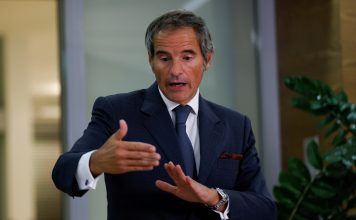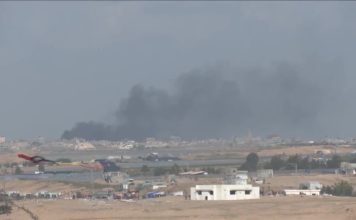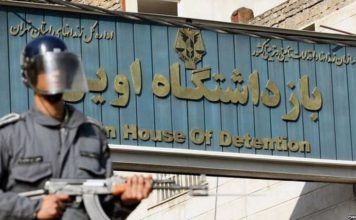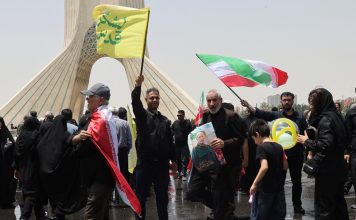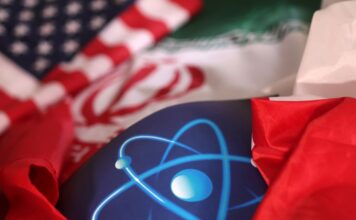By Kayhan Life Staff
During an election campaign rally in Sanford, Florida, on Oct. 12, U.S. President Donald Trump said: “We took out the world’s number one terrorist, and the mass murderer of American troops and many people around the world, Ghasem Soleimani. He is dead.”
Lieutenant General Ghasem Soleimani, the commander of the Islamic Revolutionary Guards Corps’ Qods Force (IRGC-QF), was killed in a U.S. drone attack on Baghdad International Airport on Jan. 3.
“I withdrew from the last administration’s disastrous Iran nuclear deal, which was a catastrophe,” Mr. Trump, who had just recovered from COVID-19, told his supporters. “What a horrible deal. But we broke the deal, and I tell you the first call out yet after we win the election, will be from Iran, dying to make a deal, because they are down 28 percent [in] GDP [gross domestic product]. Nobody has ever heard of a thing like that. That will be the first call I’ll get.”
“They [Iranians] cannot have a nuclear weapon,” he added.
The Joint Comprehensive Plan of Action (JCPOA), better known as the Iran nuclear deal, is an agreement reached in Vienna in July 2015 between the Islamic Republic and the five permanent members of the UN Security Council, namely China, France, Russia, Britain and the U.S. plus Germany (P5+1) together with the European Union (EU).
The U.S. unilaterally withdrew from the JCPOA in May 2018.
[aesop_image img=”https://kayhanlife.com/wp-content/uploads/2020/10/2020-10-18T234058Z_1626910593_RC2BLJ9E2T8I_RTRMADP_3_USA-ELECTION-TRUMP-scaled.jpg” panorama=”off” credit=”U.S. President Donald Trump raises his fist during a campaign rally in Carson City, Nevada, U.S., October 18, 2020. REUTERS/Carlos Barria” alt=”U.S. President Donald Trump raises his fist during a campaign rally in Carson City, Nevada, U.S., October 18, 2020. REUTERS/Carlos Barria” align=”center” lightbox=”on” captionsrc=”custom” captionposition=”left” revealfx=”off” overlay_revealfx=”off”]
In an interview with the New York-based Newsmax TV on Oct. 9, U.S. Secretary of State Mike Pompeo praised President Trump for pulling out of the JCPOA and reimposing strict sanctions on Iran.
“The most important thing that President Trump did was [to] recognize that the nuclear deal was dumb, that it was bad for America, that it presented a real risk. And so he ripped America out of that, back in May 2018,” Secretary Pompeo said. “We recognize the Islamic Republic of Iran as the greatest threat to that peace–the greatest threat, frankly, to Americans all across this great country. And so, we have put enormous costs on the regime itself.”
Speaking about the latest U.S. sanctions targeting 18 major Iranian banks, Mr. Pompeo noted: “So the sanctions you saw yesterday [Oct. 8] were just the latest in scores of sanctions we have put on them. We have denied tens and tens of billions of dollars that the Iranians frankly would have had if we just kept doing what the previous administration did: fund, fuel, and feed the Iranian regime.”
“President Trump said we would not do that. And so, they’ve had less money — less money to foment terror, less money to build up their nuclear program, and fewer resources to challenge the United States all across the world,” Pompeo added.
Despite the ongoing war of words between Tehran and Washington, Trump has repeatedly said he would renegotiate a new nuclear deal with Iran.
In June, Mr. Trump said it would be in Iran’s best interest to open talks with the U.S. before the election.
“Don’t wait until after the U.S. election to make the Big deal. I’m going to win. You’ll make a better deal now!” he tweeted.
However, Iran’s Supreme Leader Ayatollah Ali Khamenei has always opposed direct talks with the U.S.
Which of these two leaders will turn out to be right? Trump, who predicts Iran would rush to open talks over the nuclear deal and sanctions relief — were he to win a second term — or Mr. Khamenei and other senior Iranian officials, who oppose direct negotiations with the U.S. under any circumstance?
Is there a power center independent from the leader’s inner circle in Iran that has made overtures to the U.S.? If so, who has sent messages to Washington without Khamenei’s knowledge? Is it not a fact that no negotiation can take place with the U.S. without Khamenei’s approval?
During a remote video address to the officer schools of the Islamic Republic of Iran’s Armed Forces on Oct. 12, Khamenei lambasted the U.S. for its hostile policy towards Iran.
“Some people speak of a sensible approach, which reveals their fear, apathy, and desire to flee the enemy. Being scared and running away are exact opposites of rational thinking,” Khamenei was quoted by the Tasnim news agency as saying. “Cowards may not speak about a sensible approach. Rational thinking means making calculated decisions. However, the enemy promotes a perverted version of a rational approach. Some people here repeat the enemy’s rhetoric, unwittingly.”
Criticizing the U.S. for warning the world about Iran’s missile program and regional activities, Khamenei noted: “Such trash talks stem from their [U.S.] fear and being behind in this field. We must stay on a rational path despite this propaganda. The Islamic Republic will advance in various fields, God willing.”
While Khamenei’s supporters consider the JCPOA a failure of President Hassan Rouhani and his government, everyone knows that Iran would not have signed the agreement without the Leader’s blessing. Khamenei’s face-saving “heroic flexibility” enabled Mr. Rouhani and Foreign Minister Mohammad Javad Zarif to sign the JCPOA in 2015 and make several crucial concessions to the West, including curbing Iran’s nuclear program significantly.
However, senior Iranian officials have always maintained that signing the JCPOA was part of the state’s overall policy and not a single person’s decision.
In comments reported by Tasnim in October 2016, Ali Akbar Velayati, a special advisor to Khamenei on international affairs, said signing the JCPOA was a decision made by “the state and not an individual,” adding that the country had to “make the deal because failing to negotiate would have led to war.”
The current situation is similar to that of 2015, except that Trump and his administration have set more stringent conditions for holding talks with Iran. Tehran had a much easier time complying with Obama’s list of demands. The JCPOA allowed Iran to restart its nuclear program after a certain period.
Even with a Trump defeat, the future of the nuclear deal is uncertain.
This article was translated and adapted from Persian by Fardine Hamidi.

